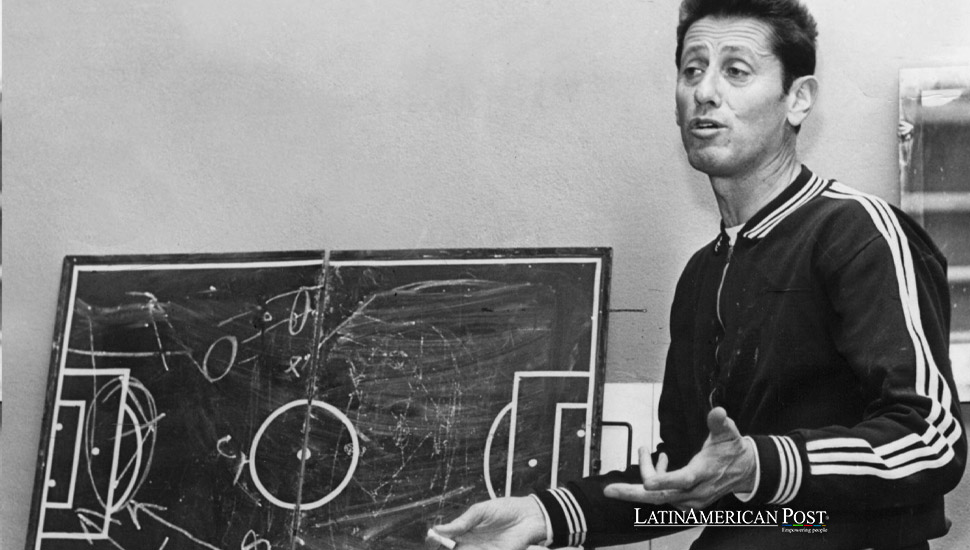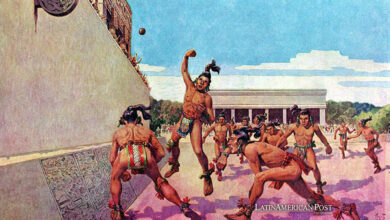The Untold Story of Uruguay’s Maracanazo Hero

Juan Alberto Schiaffino’s unpublished memoir, a unique and exclusive document, unveils the behind-the-scenes details of Uruguay’s historic victory over Brazil in the 1950 World Cup.
Juan Alberto Schiaffino, a key player in Uruguay’s legendary ‘Maracanazo’ victory over Brazil in 1950, meticulously documented every detail of that historic match in a book that was never published during his lifetime. Schiaffino began writing his memoir after retiring from professional soccer and completed the first part in 1974. He continued adding analyses of subsequent World Cups, concluding with the tournament held in Spain in 1982.
“This is a true treasure for both Uruguayan and international soccer,” says journalist Eduardo Rivas in an interview with Agencia EFE. Rivas received Schiaffino’s manuscripts from the nephew of the former player, who had played for clubs like Peñarol and AC Milan. While collecting material for another project, Rivas met with the families of the players who represented Uruguay in 1950. During one such meeting, Raúl Schiaffino, Juan Alberto’s nephew, showed him a folder containing typewritten pages and several drawings.
A Hidden Gem Discovered
Despite Raúl Schiaffino’s initial doubts about the potential interest in the material, Rivas quickly recognized its significance. “It maintains colossal relevance in many aspects. Not to mention what he recounts about his career and the significance of Maracanã. He is very meticulous in everything he writes,” Rivas emphasizes. With the manuscripts in hand, Rivas began compiling them into the book La Memoria de Schiaffino, published by Editorial Planeta, whose first edition was released in July of this year.
One of the central topics Schiaffino covered in his book was the historic World Cup final held on July 16, 1950, at Rio de Janeiro’s Maracanã Stadium. On that day, before nearly 200,000 spectators, Uruguay defeated Brazil 2-1 in a match they had started by losing and could only win with a spectacular comeback. “Participating in the 1950 World Cup was something new, which excited my curiosity. It represented an unprecedented experience in my sports career that could open new perspectives for me, besides the honor of upholding the legacy of those who had so brilliantly preceded us in defending the classic sky-blue jersey,” wrote Schiaffino, who scored the first goal in the final and passed away in 2002 at the age of 77.
Memories of a Legendary Victory
Schiaffino also recalled the previous matches, the challenging encounter against Spain in the final group stage, the dramatic victory over Sweden, and the Brazilian fans’ deafening, impressive reception of their team. He highlighted his goal in the final as “the fondest memory” of his sports career. Rivas notes that the principal revelation he found in Schiaffino’s book was the player’s detailed drawing of Uruguay’s tactical system. “It breaks with all the oral and written tradition we had about positioning the Uruguayan players on the field,” he asserts.
Rivas explains that Schiaffino described and illustrated the tactical setup, naming each player. “This is an enormously important document for me. It is the main revelation of the book, at least from a sporting perspective,” he summarizes. The social implications of the ‘Maracanazo’ were also significant. Rivas recalls how the players formed friendships despite the competition. “The Uruguayans felt it was hard to openly celebrate their achievement because they knew how much it affected the Brazilians. That’s where a friendship began, which I think is the ideal in sports,” Rivas comments.
A Legacy of Sportsmanship
In line with this sentiment, Rivas highlights that the players “gave a lesson in sportsmanship” by never boasting about their victory, pointing out that this is “another great part of Maracanã.” The discovery of Schiaffino’s memoir has provided a new dimension to understanding that historic match and its events. His meticulous account offers a unique perspective on the time’s strategies, emotions, and social dynamics.
The publication of “La Memoria de Schiaffino” significantly contributes to the documentation of soccer history, particularly for those interested in the 1950 World Cup and its impact on international sports. It serves as a testament to Schiaffino’s legacy and the enduring importance of the ‘Maracanazo’ in the annals of soccer.
In the broader context of soccer history, Schiaffino’s detailed recollections provide valuable insights into the game’s evolution and the cultural significance of major tournaments. His account is not just a personal memoir but a critical piece of sports literature that enriches our understanding of one of the most memorable moments in World Cup history.
Also read: Uruguay’s Historic Triumph and the Legacy of Paris’ Yves du Manoir Stadium
The story of the ‘Maracanazo’ resonates with soccer fans worldwide, symbolizing the unpredictability and excitement that make the sport so beloved. Schiaffino’s memoir captures the essence of this legendary match, preserving it for future generations to appreciate and learn from.





